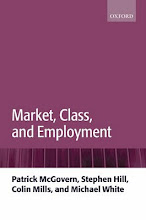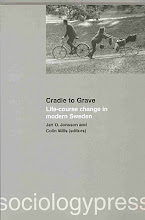I and a coauthor have an article under consideration at a leading British sociology journal. To her surprise she received an email from the editor of the journal asking her to take down the copy of the paper hosted on the work in progress section of my website before the journal would send the paper out to referees. There is nothing sinister about this and it is, no doubt, done with the best of intentions, but in my opinion it is quite obtuse.
Research enters the public domain in all sorts of ways, as conference papers, press releases, working-papers and so forth. Grant awarders want early dissemination and the only way to do that - given the length of time journals take to publish - is to write working papers and disseminate them as widely as possible, which usually means electronically. To try and enforce a double-blind refereeing procedure is to stand Canute like before the waves.
The only potential victim, if they choose to reveal their identity by putting a paper in the public domain, is the author themselves. If they, in effect, wave their right to anonymity what business is it of the journal to try and retrospectively impose it on them? This is doubly true when this 'policy' (along with others I've brought attention to in the past) is not mentioned in the journal's guidance to authors. Personally I'm willing to trade the scientific benefits of early dissemination against the small probability of a prejudiced reviewer - and I really believe that probability is small. Referees can be many things: careless, yes; ill informed, yes; incompetent, yes. But I've rarely read a referee's report that seems to be motivated by pure malice.
I rarely referee an article nowadays without knowing who has written it. I don't need to Google. Academic niches are small. If you only referee work in your own field - as you should - then you know who the players are and what they are up to. You probably refereed their last grant application. You certainly saw their presentation at the last conference. If you can't recognize the author then you don't know what is going on and you aren't fit to referee.
Some months ago I discussed this very issue with an economics colleague. He told me that nobody reads the articles in economics journals. By the time they are published they are old news. Publication is just the kite mark, but everybody has read the working paper and formed their own opinion long before that. That's how things are in a serious discipline.










No comments:
Post a Comment